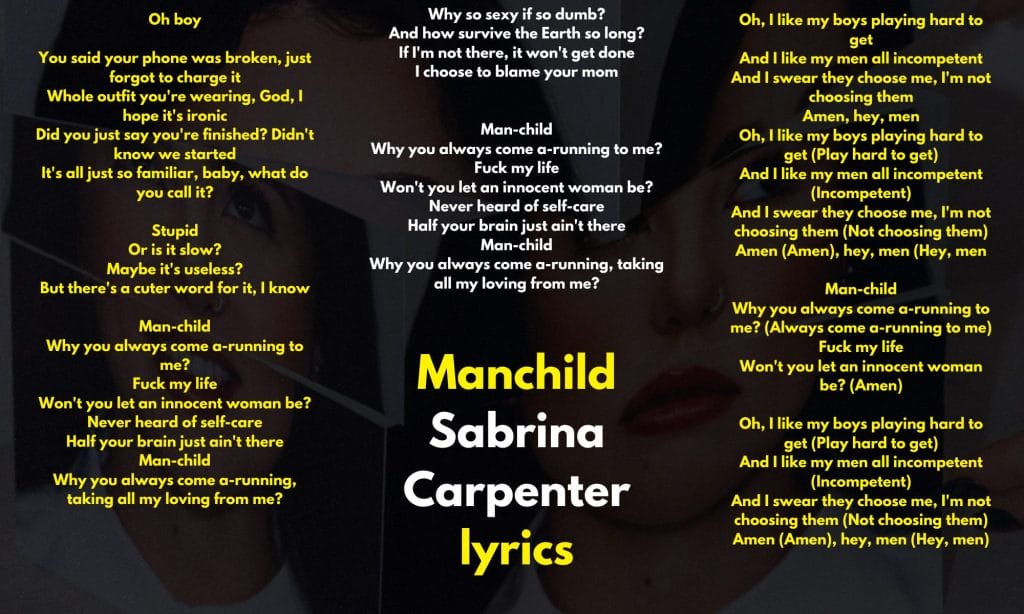
Manchild Sabrina Carpenter Meaning And Lyrics Reflect a Pattern Others Have Tracked for Decades
Table of Contents
Image Courtesy Of Sabrina Carpenter
If you’ve been anywhere near a car radio, a festival stage, or a TikTok algorithm this week, you’ve probably already heard “Manchild” — Sabrina Carpenter’s latest single and the opener to her upcoming album Man’s Best Friend. It dropped on June 5, right before she hit Primavera Sound in Barcelona, and immediately went number one on Spotify’s U.S. chart. If you missed the teaser campaign: it involved billboards over I-69, a smug pink pig emoji, and the line “This one’s about you!!”
That set the tone. The song is sharp, quick, and surprisingly structured for how off-the-cuff it feels. It’s also the result of another session with Jack Antonoff and Amy Allen — a writing team that’s already earned her one No. 1, a Grammy, and probably a few stress dreams from exes.
What follows here is just my own close read of the lyrics, shaped by the way I tend to hear music through the lens of fiction, poetry, and long afternoons trying to finish short stories. I’ve always been interested in how pop writing overlaps with literary patterns — how a song that feels like a joke can still carry the weight of a real emotional cycle. Sabrina herself described the track as “the song embodiment of a loving eye roll” and said it would soundtrack the mental montage of her young adult years.
That felt like a good invitation to stretch some literary comparisons and see what actually hits and what’s just pop-music flim-flam. These are just my own takeaways — no authority, no analysis-speak, just a chance to hold the lyrics up to the light a little longer and see what we notice.
“Manchild” at a glance
- It’s a warning and a wink. The lyrics walk the line between exhaustion and humor, showing a dynamic that’s worn thin without sounding bitter or broken.
- Sabrina’s voice stays calm, but the writing’s sharp. The jokes hit because the speaker sees the pattern clearly — and is already halfway out the door.
- Every line is doing two jobs. The surface-level sarcasm is funny, but underneath, there’s a full emotional record of what caretaking fatigue really feels like.
Manchild Lyrics
Breaking Down The Meaning
You said your phone was broken, just forgot to charge it
Sabrina opens the song with a detail that sounds small on its own, but it sets the pattern for everything that follows. The excuse about the phone not working — when really it just was not charged — reflects a kind of carelessness that gets passed off as harmless. But these kinds of moments pile up. This lyric is about what happens when someone continually shows that their time and energy are not organized around mutual effort. This kind of repeated behavior makes the speaker feel like she is always one step ahead, always the one who has to remember what matters, while he coasts through with no plan.
When she adds, “Did you just say you’re finished? Didn’t know we started,” she moves into a more cutting kind of observation. He believes something real happened between them, while she never even had the chance to feel like it began. That line stands out to me because it carries two weights at once — surprise and sarcasm. In the poem The Sofas, Fogs, and Cinemas, Rosemary Tonks writes: “There’s a man who comes to my bed with no smile or purpose.” That tone — of someone present but emotionally vacant — lives inside Sabrina’s line. It is the disorientation of being with someone who thinks they are giving something when in truth they are only taking up space.
This kind of framing — where the woman is already ahead of the pattern — shows up again and again in this first verse. The speaker is tired. She sees the dynamic for what it is. And that clarity gives her room to be funny about it, even while pointing out how exhausting it can become.
Stupid / Or is it slow? / Maybe it’s useless?
The pre-chorus works as a turning point. The speaker runs through the possible labels that might apply here. She does not land on any one word until she reaches the one that fits best — manchild. That word is meant to classify. It has a kind of lightness to it, but it is also precise. It speaks to someone who has aged physically but has not developed emotionally or practically. Someone who expects others to handle the consequences of their actions because they have never been asked to do it themselves.
There is a line in Mona Van Duyn’s poem What the Light Was Like that comes to mind here: “You were always so busy not noticing.” It matches the speaker’s tone in this section. She does not need to scream or break things to make her point. She just names what has been happening. And that calm delivery often cuts deeper than any emotional outburst would. In both the song and the poem, the weight of the moment comes from the slow buildup of being overlooked again and again.
This part of the song also reflects Sabrina’s own comment from her interview where she described the track as the “song embodiment of a loving eye roll.” That is exactly how this line functions. The speaker is rolling her eyes — not out of anger, but because she knows this situation too well. She does not need to argue with him anymore. She only needs to name the pattern out loud.
Man-child / Why you always come a-running to me?
The chorus gives the full picture. The manchild in question returns again and again, not to share love or connection, but to offload needs. The speaker is not offering support. She is being leaned on without consent. The phrase “taking all my loving from me” makes that clear. This is not someone who is offering her affection. This is someone who is draining it. There is a difference between giving love and having it taken from you by someone who assumes it is theirs by default.
In Louise Bogan’s Women, she writes: “They live by twos and twos, / In the slow twilight of their hooded eyes.” It is an image of a woman paired with a man, not because of connection, but because of expectation. What Bogan was noticing then — and what Carpenter writes into this chorus — is how many women are treated like a default support system. The speaker does not ask for this man to show up at her door. He just does. Over and over again. And each time, she has to either give him what he wants or deal with the guilt of withholding it.
Sabrina’s use of the phrase “fuck my life” reads like a sigh, not an explosion. It captures that moment when you realize someone is going to ask for more of your energy again, even though they have done nothing to earn it. It is not sadness. It is the weight of knowing the cycle has already begun again.
Why so sexy if so dumb?
The second verse shifts from quiet observation to sharper edge. This line — “Why so sexy if so dumb?” — is honest in a way that pop lyrics rarely allow. She is naming the dissonance between attraction and disappointment. The speaker is frustrated that someone who looks put-together on the surface turns out to be completely unable to function in a relationship. That mismatch is part of what makes the dynamic so frustrating. If the manchild looked immature, it might be easier to avoid him. But the disguise — the outward charm or appeal — makes the emotional gap even wider.
“Your spirit, like mine, shrank with the years,” writes Van Duyn later in What the Light Was Like. That line fits here, too. When the speaker says, “If I’m not there, it won’t get done,” she is not bragging. She is describing what it feels like to carry someone else’s weight for too long. Over time, doing that takes something out of you. You begin to expect less. You begin to feel smaller. That is not love. That is maintenance.
Then she says, “I choose to blame your mom.” It is a joke, but it lands. The speaker is pointing to how he was raised, how he was shaped, how so many boys are taught to expect care from women without ever being taught to return it. The line is funny because it is true. The behavior comes from somewhere. It has been allowed for too long.
And I swear they choose me, I’m not choosing them
The bridge turns the focus inward, but not in a way that blames the speaker. Instead, she is naming something that many people feel but rarely say: these relationships keep happening, even when you believe you are avoiding them. The speaker is not seeking these men out. They appear again and again, drawn to the kind of woman who has the capacity to fix what they have never had to build for themselves.
That is what makes the repetition in this part of the song feel so familiar. The speaker jokes, “I like my men all incompetent,” but the humor does not take away the truth. Rosemary Tonks, again in The Sofas, Fogs, and Cinemas, talks about “the boredom of pretended love.” That matches the mood here exactly. The speaker is pretending to enjoy this dynamic for the sake of humor, but the pattern is hollow. It leaves nothing behind but fatigue.
When she closes with “Amen, hey, men,” it is both a prayer and a punchline. She is blessing the mess while also washing her hands of it. The phrase reads like a sendoff — not bitter, not broken, but done.
Looking At The Broader Picture
The first thing that stood out to me about “Manchild” wasn’t the chorus or the beat — it was the tone. That deadpan, unbothered, fully-tapped-out tone. From the moment Sabrina sings, “You said your phone was broken, just forgot to charge it,” the whole shape of the dynamic is already clear. This is not her first time dealing with this kind of man. And she doesn’t need the whole song to explain him.
He’s careless, emotionally unavailable, but still somehow expects comfort and attention like it’s owed. That’s the cycle being sketched out here. She’s documenting it with enough distance to be funny.
This is part of what she meant when she called the song “a loving eye roll.” It’s not bitter. It’s just tired — and honest in a way pop songs usually try to sugarcoat.
That tired honesty has a long history. Louise Bogan’s Women talks about how women are pushed into being “passive, ambitious for comfort only.” She’s not praising that setup — she’s noticing how often women are expected to absorb the emotional messes that men either can’t or won’t handle. The speaker in Manchild isn’t taking that deal anymore. She’s past the point of trying to help, and past the point of pretending the guy will change. Instead, we get lyrics like “If I’m not there, it won’t get done” and “I choose to blame your mom.”
They sound light, but they’re serious.
That’s the same voice Mona Van Duyn uses in What the Light Was Like — the speaker is simply tracking it over time, watching how the balance in their relationship shifts from love to duty. That’s what Manchild captures too. Not one argument. A pattern.
Even the way “Manchild” was released plays into this. The rollout was calculated and playful — teaser billboards, meme-ready visuals, a music video that leans into chaos — and it debuted live in front of thousands of fans at Primavera Sound in Barcelona. Streaming-wise, it went straight to number one on Spotify U.S. the day it dropped. So yes, it’s a hit. But it’s not empty. Under the jokes, there’s a real emotional pattern being drawn out — one that lines up closely with Rosemary Tonks’s The Sofas, Fogs, and Cinemas, which follows a speaker stuck with a man who brings “no smile or purpose” to her life. Carpenter’s “Did you just say you’re finished? Didn’t know we started” belongs in that same lineage.
It’s not just that she sees through him — it’s that she already knows how the story ends. And that’s what gives the song its shape. It moves fast, but it lands hard because she’s speaking from experience, not theory.



